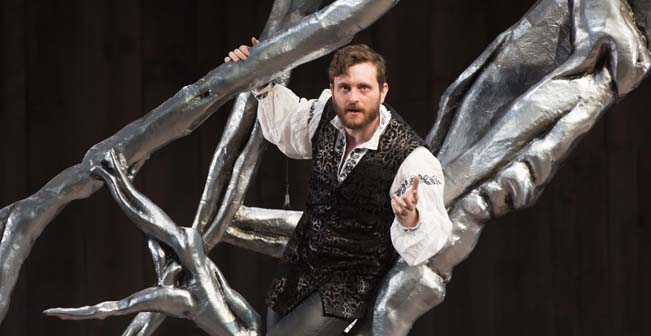Culture
 Photo: Scott Suchman
Photo: Scott Suchman
Ken Clark’s King Arthur Leads with Heart
June 15, 2018 @ 12:00am
This classic tale of one of the world’s most famous – and heartbreaking – love triangles and the noble man caught in the center of it is at Shakespeare Theatre Company’s Sidney Harman Hall through July 8. Directed by Shakespeare’s very own Alan Paul, Camelot follows Arthur from the moment he meets his beloved bride Guenevere until the last time he sees her face.
“Love and marriage – don’t conflate the two!”
The audience laughs, but Merlyn (played by actor Ted van Griethuysen) is quite serious when talking to a young Arthur (Ken Clark), who is trying to sneak a peek at his bride-to-be Guenevere (Alexandra Silber).
Even in the first scene, as Arthur props himself between branches and pesters Merlyn with questions about Guenevere – “Is she pretty or very pretty?” – the future king exposes his sincerest qualities from the beginning: hope for his marriage and affection toward Merlyn. These inherent qualities, hope and affection, guide his principles and spur the ideals to reinvent Camelot through his reign.
“It’s a play about our basic natures, and our attempt to overcome and even alter those natures,” Clark explains in a recent interview with On Tap. “Arthur never gives up on his own convictions in order to save his realm, and that’s what makes him different – because people do bad things in the name of the greater good, but Arthur doesn’t.”
The timeline of the play, spanning years, allows for greater character development not only for King Arthur but also for Guenevere and Lancelot – a Knight of the Round Table who becomes Arthur’s dear friend and ultimately falls madly in love with his Queen. Subtle mentions of time in dialogue help keep the audience aware of where we are in the story, but the characters also provide cues based on changes in tone and attitude. Clark says one of the great things about playing Arthur is portraying him during his lifelong journey.
“You follow him from boyhood to older manhood, and all of the things that change along the way. You get an opportunity to play those human circumstances and apply them to a dramatic scene. That is a rare, rare opportunity for an actor.”
The medieval period generally evokes imagery of bloodshed and knights in armor battling for land – or a woman. In other words, a play based in this period of history can be expected to have a very masculine display with limited range in a man’s emotions. But Camelot’s King Arthur represents a courageous leader who is well-respected because of his emotional vulnerability and not in spite of it – a symbol for modern men that feels very necessary to represent onstage in 2018. It’s important, Clark says, for a leader to show vulnerability.
“I think that we need to make it very clear that you can be masculine and vulnerable. The two are not mutually exclusive. And in this day and age, I think that needs to be clear, especially for young men. You can be emotionally available, you can listen, you can be sensitive – and you can still be masculine. They should go hand in hand.”
When the pompous (yet somehow still endearing) Lancelot (played by Nick Fitzer) arrives on the scene, he’s a French knight who has the type of energy you’d expect. He’s always ready to swing the sword and quick to insert self-praise into regular conversation. But he kneels before King Arthur immediately, demonstrating how powerful the King’s presence is even beyond Camelot.
“It helps that the other actors are so good,” Clark says of his castmates. “When you put something out and you get it knocked right back to you, it makes it a lot easier to get to those deep, emotional places.”
The 29-year-old says casting a young King Arthur makes the Shakespeare Theatre Company’s production unique and modern in another way.
“First and foremost, it makes the love triangle more compelling – certainly from Guenevere’s standpoint. If you have a much older Arthur, then the audience is going to be like, ‘Well of course she’s going to go with Lancelot.’ But if you can present a more loving, tender, romantic, sexual relationship between Arthur and Guenevere, it makes it that much more compelling when Lancelot comes around, which I think is a smart way to do it. I’m certainly glad they did it that way!”
Arthur and Guenevere’s genuine love for each other makes it easy for them to be the right royal duo to implement changes in Camelot. Clark’s favorite scene is when the pair imagine the Round Table for the first time.
“[This scene] is a window into their marriage when it’s still a very good, strong partnership, and it’s a look at what two people who love each other can do when they trust [each other] and work well together,” he says.
This is one of several scenes with a deliberately intimate setting, allowing the dialogue and chemistry between the actors to shine through. The stage is stripped of visual noise and an array of candles tranquilize the atmosphere. Our eyes follow Guenevere as she moves around Arthur, and delights in their forward-thinking idea with her husband. However, the audience will find it hard to pick just one favorite scene. Clark laughs as he adds, “There’s so many good scenes.”
And even with Arthur at the center of the story, Silber’s Guenevere holds her own and at times, is truly the highlight of scenes. When singing about the “lusty month of May,” Guenevere is a more mature and established queen than at the beginning of the play, but she still reveals the spirited maiden she has always been. This boisterous, vibrant dance and song sequence with the simple folk is one of my favorites.
Each actor perfectly embodies their respective characters in tongue and physical form. The songs are a performance in their own right, granting applause from the audience every time. The use of space is impactful as well, with a character running through the audience aisle or appearing under a spotlight offstage, and Paul even uses floor-to-ceiling space to give the audience dual point of views.
Clark delivers a King Arthur who is relatable in 2018. He says Shakespeare Theatre Company wants to interpret plays thoughtfully, which isn’t easy for a production like Camelot that has a well-known story and is full of household songs.
“They don’t want to put Camelot up and see who comes. They want to take the ideals and ideas that make Camelot special and put them on full display. There’s so much more going on in the story, and STC – especially [director] Alan Paul – has been dedicated to making sure those ideas are at the forefront of this production. I’ve been wanting to work [at Shakespeare] for a long time, and it’s been everything I hoped.”
Camelot runs through July 8, and tickets start at $59. Learn about Shakespeare’s Young Prose Nights and discounted tickets at www.shakespearetheatre.og.
Shakespeare Theatre Company’s Sidney Harman Hall: 610 F St. NW, DC; 202-547-1122; www.shakespearetheatre.org








